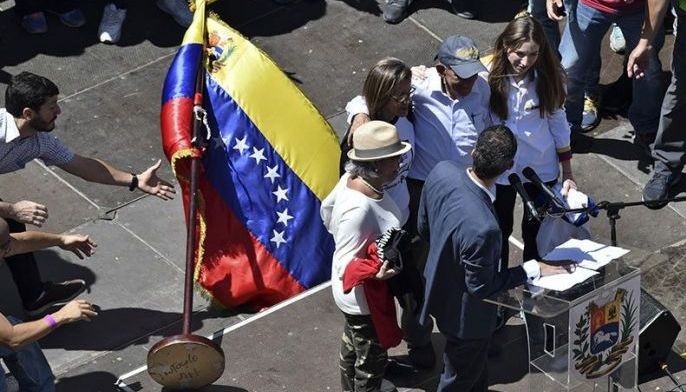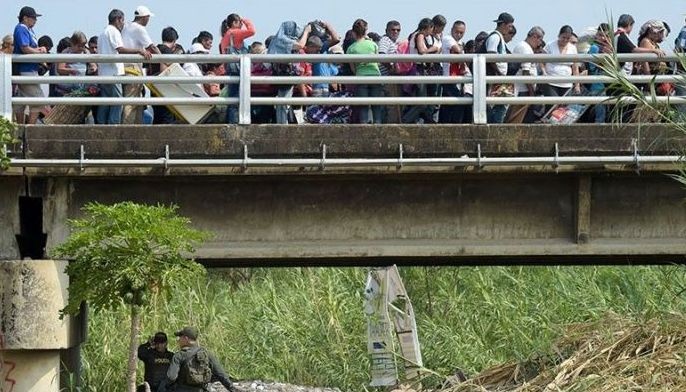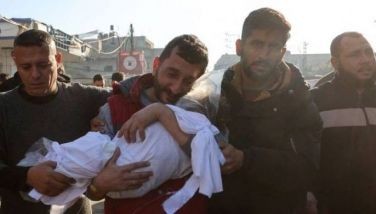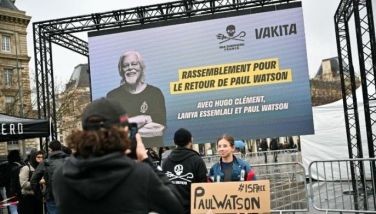Venezuela's Guaido and Pence agree to tighten noose on Maduro
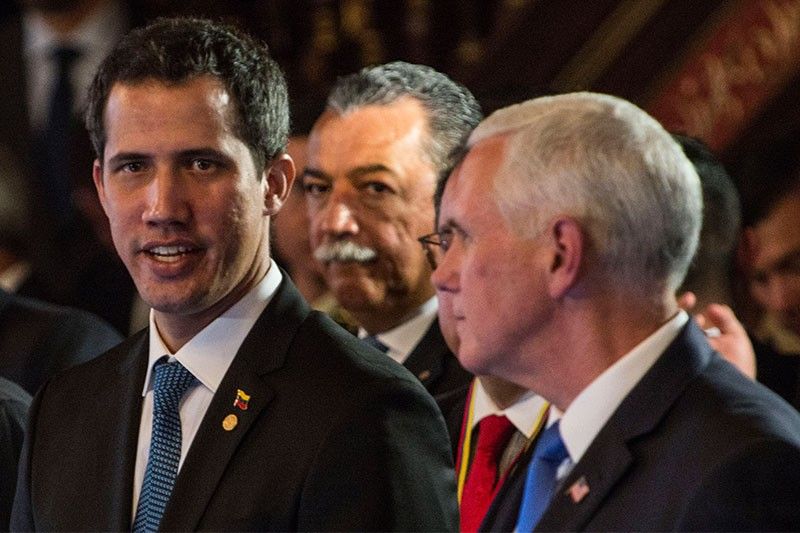
BOGOTA, Colombia — US Vice President Mike Pence and Venezuela opposition leader Juan Guaido agreed on a strategy to tighten the noose around President Nicolas Maduro following a meeting with regional allies in Colombia on Monday.
"We hope for a peaceful transition to democracy but President Trump has made it clear: all options are on the table," said Pence, who passed on Trump's "100 percent" support to Guaido.
The meeting came after four people were killed and hundreds injured as Guaido supporters clashed with Venezuelan security forces on the borders with Colombia and Brazil over the weekend in a thwarted bid to bring in humanitarian aid.
The Lima Group -- made up of Latin American countries and Canada -- met in Bogota and said it would ask the International Criminal Court to declare "the violence of Maduro's criminal regime against the civilian population and the negation of access to international aide as a crime against humanity."
Guaido warned that "indulging" Maduro "would be a threat to all of America," while Colombia President Ivan Duque called for "more powerful and effective" pressure on the socialist leader.
However, the Lima Group rejected the use of force to achieve a democratic transition.
The US requested an urgent meeting of the UN Security Council and imposed new sanctions on the governors of four Venezuelan states aligned with Maduro for impeding aid shipments.
Guaido, the 35-year-old leader of Venezuela's National Assembly, declared himself acting president in January after the opposition-controlled legislature concluded that Maduro was fraudulently re-elected.
Some 50 countries recognize him as Venezuela's legitimate interim president.
'Victory'
Despite the defection of more than 150 soldiers to Guaido's side, Maduro's military blockade at Venezuela's borders held firm and prevented the aid from entering.
Maduro's right-hand man Diosdado Cabello proclaimed "victory" on Sunday.
"Not a single one of those trucks with aid got through," Cabello said at a rally in the border town of Tachira.
Humanitarian aid has become the focal point in Guaido's challenge to Maduro's authority.
Venezuela is suffering a humanitarian crisis marked by shortages of food and medicine -- problems exacerbated by hyperinflation, which has rendered salaries and savings worthless.
Guaido says 300,000 people face death if aid supplies are not urgently brought in, but Maduro claims it is a smokescreen to cover a US invasion.
Guaido accused Maduro's government of turning the country into "the sanctuary of terrorists."
"The reality in Venezuela is we have a regime that is against its people," he said on Sunday.
"Today, we need to find a way to solve this crisis."
Having defied a government travel ban to got to Colombia on Friday, Guaido said he would return home "this week," with the Lima Group warning he faced "serious and credible threats" from the regime.
At the opening of the Lima Group meeting, Colombia's Foreign Minister Carlos Holmes Trujillo said the representatives were "trying hard to facilitate the opening of a humanitarian corridor."
Pence announced $56 million in funds for countries hosting Venezuelan migrants.
The United Nations says 2.7 million Venezuelans have fled the country since 2015.
Pence also invited Lima Group members to transfer assets of Venezuela's state oil company PDVSA to Guaido to keep them away from "Maduro's inner circle."
Eurasia Group analyst Risa Grais-Targow said US sanctions "will make it difficult for President Nicolas Maduro to retain power; however, an eventual transition is contingent on both continued opposition unity and viable off-ramps for regime insiders."
The Lima Group of 14 nations is not united in its approach to the Venezuela crisis and Mexico, Costa Rica, Guyana and Saint Lucia skipped the meeting.
But Guaido rallied those present, saying: "It's important to recover democracy in Venezuela because those usurping power today are a threat to the continent's stability."
'No consensus'
Bolivia's President Evo Morales, a Maduro ally, called on the Lima Group to "seek a solution through dialogue."
"In the Lima Group, the consensus is that Maduro must be removed, but there is no consensus on how to do that," political scientist Laura Gil told AFP.
Maduro seems to have won this round in the power struggle, but on Sunday, US Secretary of State Mike Pompeo said he was confident that "Maduro's days are numbered."
More than 300 people were injured during the clashes between security forces and protesters at crossings on the Colombian and Brazilian borders.
A 14-year-old boy was among those killed Saturday near the Brazilian border.
NGO Foro Penal said on Monday that 58 people had suffered gunshot wounds.
The European Union on Sunday condemned the government's use of violence and armed civilians to block the aid entry, while UN Secretary-General Antonio Guterres said he was "shocked and saddened" by the civilian deaths.
There were sporadic clashes between hooded protesters and police, supported by armed civilian "colectivos" on Sunday on the Venezuelan side of the border.
Scores of Venezuelans who managed to slip across the border to get aid were trapped there as Venezuelan authorities closed it.
Venezuelan President Nicolas Maduro accuses Colombia of being behind an "attack" with an explosive-laden drone he said targeted him on Saturday (Sunday, Manila time).
Speaking shortly after state television showed him cut off mid-speech in front of a Caracas military parade by a bang, Maduro says a "flying object exploded in front of me" and blamed the incident on Colombia's President Juan Manuel Santos.
"It was an attack to kill me, they tried to assassinate me today," Maduro says in a state broadcast. "I have no doubt that the name Juan Manuel Santos is behind this attack." — AFP
The government of Nicolas Maduro and the Venezuelan opposition broke a political stalemate Saturday with a broad social accord, and the US government responded by allowing a major US oil company to resume operations in Venezuela.
The accord heralded a potential easing of a grinding economic and political crisis in Venezuela.
It paves the way for the United Nations to oversee a trust fund of frozen assets of the Maduro government to be used for a variety of social projects in the South American country, including programs related to education, health, food security, flood response and electricity.
"We have identified a set of resources belonging to the Venezuelan state, frozen in the global financial system, to which it is possible to access," said Dag Nylander, an envoy from Norway, which facilitated the negotiations. The amount to be released was not specified.
The agreement, signed in Mexico, ended 15 months of stalemate between the two sides, potentially easing a massive flow of refugees from Venezuela throughout the region and even impacting world oil markets.
Maduro praised the deal on Twitter, saying it "opens the way for a new chapter for Venezuela, to keep advancing towards the peace and well-being that all Venezuelans yearn for." — AFP
A US delegation arrived in Venezuela Monday to discuss a "bilateral agenda," extending discussions between Caracas and Washington initiated in March, said Venezuelan President Nicolas Maduro.
National Assembly speaker, Jorge Rodriguez, "is receiving a delegation from the government of the United States, an important delegation that arrived two hours ago in Venezuela," Maduro announced on national public television VTV at around 8:00 pm (0000 GMT).
Rodriguez is also the Venezuelan government's negotiator in talks with the opposition, which have been at a standstill since last October.
Washington had sent a high-level delegation to Caracas in early March, a few days after Russia invaded Ukraine. Several observers said the move was aimed at trying to distance Caracas from one of its main allies, Moscow, and discussing an easing of US sanctions on Venezuelan oil after the invasion caused a spike in global fuel prices.
The White House confirmed the meeting but only said the discussions had focused in particular on American "energy security." Before its rupture with Washington, Venezuela exported almost all of its oil production to the United States.
After those discussions, Caracas released two Americans detained in Venezuela in what was widely seen as a goodwill gesture.
In May, Washington announced it would ease some limited sanctions against Venezuela, including one linked to the oil company Chevron, to promote dialogue between Maduro's government and the opposition. -- AFP
The International Criminal Court has opened an office in Venezuela as part of an investigation into alleged human rights abuses during anti-government protests in 2017, authorities announced on Thursday.
The ICC opened a formal investigation into the alleged rights violations last November and signed a memorandum of understanding with Venezuelan President Nicolas Maduro which stated that the South American country would take "measures" to ensure the court would be able to work.
"It's a very important step, very significant. This is not for appearance's sake, it is something concrete that will allow me to carry out my responsibilities," said ICC prosecutor Karim Khan alongside Maduro at the presidential palace in Caracas.
"Venezuela will now have this office that will provide us with an effective level of dialogue in real time that is more efficient," said Maduro, who has been in power since 2013. — AFP
President Nicolas Maduro says that EU monitors of Venezuelan local elections were "enemies" and "spies," denying their assertion that last week's voting was marred by irregularities.
"Those who came as enemies, the delegation of spies from the European Union, found not a bit of evidence to criticize the electoral system," Maduro says of the November 21 vote for gubernatorial and mayoral posts.
Candidates that back the Maduro government were declared the winners in the vast majority of the races. — AFP
Venezuela's opposition calls on President Nicolas Maduro's government to resume talks to resolve their differences, after the ruling party withdrew from the latest round that was to begin Sunday in Mexico.
"We urge the other side to resume the sessions in Mexico as soon as possible to produce the necessary agreements," Gerardo Blyde, head of the opposition team, says at a press conference in Mexico City.
The meeting was to run until Wednesday. — AFP
- Latest
- Trending






